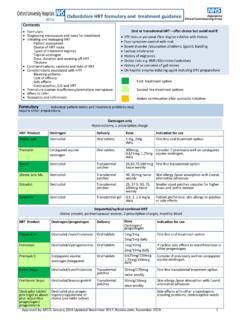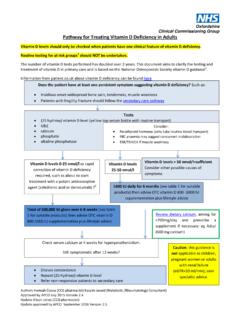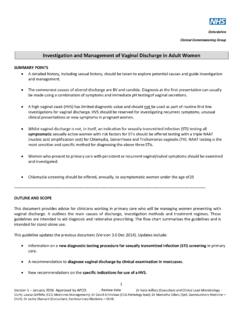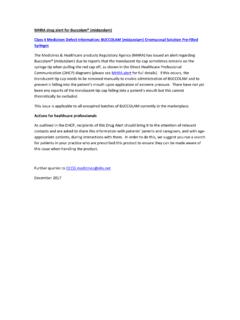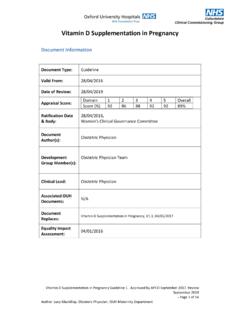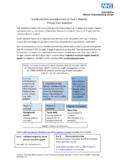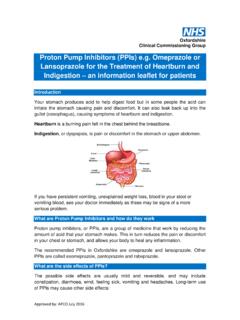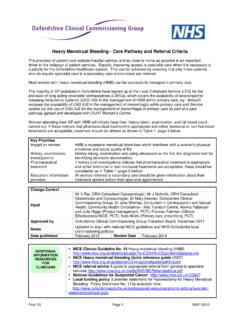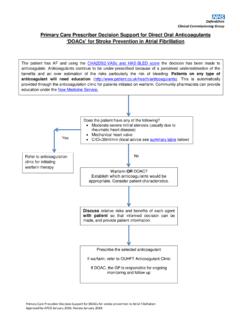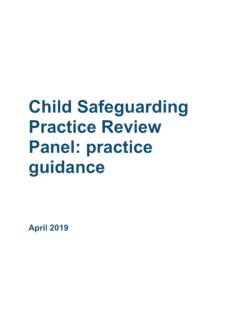Transcription of Guidance on the handling of medication errors in care homes
1 Oxfordshire Clinical commissioning Group Date produced: April 2010; Reviewed April 2013; Date for Review: May 2015. Version 2 good Practice Guidance documents are believed to accurately reflect the literature at the time of writing. However, users should always consult the literature and take account of new developments because these may affect this Guidance 1 good Practice Guidance H: handling of medication errors , incidents and near misses in Care homes Key Points A medication error is an error in the process of prescribing, dispensing, preparing, administering, monitoring or providing medicine advice, regardless of whether any harm occurred.
2 Care homes are required to have arrangements for reporting adverse events, adverse drug reactions, incidents, errors and near misses. If a resident is unwell as a result of the medication error or incident, medical assistance should be sought straight away. All notifiable incidents should be reported to the CQC. medication policies should include how to deal with medication errors , incidents and near misses. Care homes should have a clear reporting system for medication errors , incidents and near misses. There should be a regular schedule for investigating and reviewing medication errors , incidents and near misses by a designated member of staff with learnings and actions shared with all staff members involved with medicines.
3 What is a medication error? The National Patient Safety Agency defines a medication error as an error in the process of prescribing, dispensing, preparing, administering, monitoring or providing medicine advice, regardless of whether any harm occurred. errors may result in an incident or an adverse event or where averted they can be classified as a near miss . Examples of administration errors can include the following: 1. Omissions any prescribed dose not given 2. Wrong dose administered, too much or too little 3. Extra dose given 4. Unprescribed medicine the administration to a resident of any medicine not authorised for them 5.
4 Wrong dose interval Oxfordshire Clinical commissioning Group Date produced: April 2010; Reviewed April 2013; Date for Review: May 2015. Version 2 good Practice Guidance documents are believed to accurately reflect the literature at the time of writing. However, users should always consult the literature and take account of new developments because these may affect this Guidance 2 6. Wrong administration route administration of a medicine by a different route or in a different form from that prescribed 7. Administration of a drug to which the resident has a known allergy 8. Administration of a drug past it s expiry date What are the statutory requirements around reporting medication errors ?
5 From 1 October 2010, all adult social care must notify the Care Quality Commission (CQC) under the Health and Social Care Act 2008 about specific incidents. The law requires these notifications to be submitted within certain timescales further Guidance is available on what should be reported, how and in what timescales via the CQC Guidance on Statutory Notifications. The notification must be made in writing and the CQC provide template forms to simplify the notification process. Further information and Guidance is available on the Notifications section of CQCs website. What does best practice look like when dealing with medication errors ?
6 As part of the CQC Essential standards care homes are required to have arrangements for reporting adverse events, adverse drug reactions, incidents, errors and near misses. These should encourage local and, where applicable, national reporting, learning and promoting an open and fair culture of safety . If a resident is unwell as a result of the medication error or incident, medical assistance should be sought straight away. All notifiable incidents should be reported to the CQC. However, a care home should not ignore other errors , incidents or near misses but should encourage a culture that allows their staff to report incidents without the fear of an unjustifiable level of recrimination.
7 It is clear that the more evidence that is reported the more information is available about what could possibly go wrong. A medication policy should include how to deal with medication errors , incidents and near misses. Staff should be clear as to the definition of a medication error, incident and near miss . Examples of medication errors are given above. All medication errors , incidents and near misses should be reported to the duty manager to inform them what has happened and also what action has been taken to rectify the immediate situation and what has been done to prevent it happening again.
8 The resident and their relatives should be notified of any medication errors or incidents. A home should have a clear reporting system, including the requirement for a written report describing what has happened, what Oxfordshire Clinical commissioning Group Date produced: April 2010; Reviewed April 2013; Date for Review: May 2015. Version 2 good Practice Guidance documents are believed to accurately reflect the literature at the time of writing. However, users should always consult the literature and take account of new developments because these may affect this Guidance 3 was done to rectify the immediate situation and what has been done to prevent it happening again.
9 There should be a regular schedule for investigating and reviewing medication errors , incidents and near misses by a designated member of staff. The results of these regular investigations should be recorded including any actions taken such as offering training to individuals or reviewing existing procedures. Regular meetings should be held with all staff involved with medicines to review the outcomes and investigations of errors /incidents/near misses share learnings and prevent reoccurrence of similar errors , incidents or near misses. A care home should also log any incidents that occur as a result of errors made as part of the prescribing or dispensing process, for example, by GPs or community pharmacists.
10 Such errors should be discussed with the GP or community pharmacist. To help reduce administration errors , the Care Home Use of Medicines Study (CHUMS) recommends a robust system for constant review of accuracy of medicine administration records. This could be in form of a regular audit or review. It could focus on, for example, reasons for omitted doses, coding of refusals, and administration of prn (when required) medicines. What resources can help me to deal effectively with medication errors ? Further information on Notification of Other Incidents in care homes is available in Outcome 20 of the CQC Essential Standards of Quality and Safety Further information on managing medicines in care homes is available in Outcome 9 of the CQC Essential Standards of Quality and Safety CQC has a section of the website with further information about the statutory notifications.
